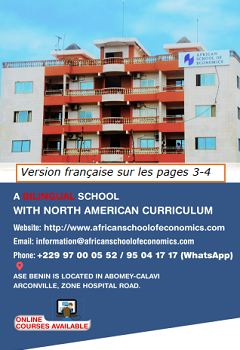The African School of Economics is a leader in higher education in West Africa because of its ability to attract highly accomplished students and scholars from all over the world. A continuation of the Institute for Empirical Research in Political Economy (IERPE) founded by Professor Léonard Wantchekon in 2004 in Cotonou, Benin, the African School of Economics is currently offering five graduate programs and a doctoral degree. A total of 18 nationalities have been represented in our student body. Those who join ASE are attracted not only by its solid curriculum, inspired by North American university standards, but also by the opportunity that attending classes in English represents.
ASE has a pedagogic model that relies on six main pillars: Applied Mathematics, Statistics and Computing, Research, African History, Work Ethic and Integrity, and Social Capital.
Applied Mathematics
ASE places a strong emphasis on core training in mathematics for all programs to bolster analytical skills. All incoming students attend a 60 hour intensive math boot camp in August in order to prepare for math courses.
Statistics and Computing
Rigorous math training is complemented with a strong emphasis on a core curriculum focusing on statistics and statistical software to strengthen quantitative skills.
Research
ASE has several active and bilingual research institutes: The Institute for Empirical Research in Political Economy (IERPE), the Institute for Finance and Management (IFM) and the Institute for African Studies (IAS). The Development Research Lab (DRL) and the Institute for Biotechnology and Agricultural Science (IBSA) are currently in development. Students have the opportunity to assist researchers in order to acquire first-hand research experience for further graduate studies or a professional career.
African History
All students at ASE, regardless of their program, enroll in African Economic History, as we believe it is of utmost importance to provide historical context to complement students’ economics training.
Work Ethic and Integrity
ASE Faculty and staff members are held to a high standard of professionalism, integrity and ethical behavior. For instance, they are all required to take the UNICEF online course on sexual harassment and the abuse of authority.
Social Capital
ASE also places a strong emphasis on creating strong social bonds among faculty members and students. A range of activities such as the Summer Institute for Economic Research (SIER) provide numerous opportunities for students, professors, and other researchers to collaborate on academic projects and present to international audiences.
Along with regular coursework, ASE offers a wide array of extra-curricular activities such as the Academic Research and Professional Seminar Series, internship opportunities, the work study program and much more. These activities are key to our approach to education as they make learning come alive while providing our students with an advantage in the job market after graduation.
Our dynamic work study program is a form of financial aid that the school offers to students through tuition reduction in exchange for 12 hours per week of student employment. Students may intern with one of ASE’s administrative departments, conduct research, and/or collaborate with logistical services.
ASE’s academic excellence is the result of its renowned faculty and researchers, who join the school from prestigious universities and research centers from across the globe. ASE places special emphasis on the ability of faculty and researchers to generate knowledge from of the connection of seemingly unrelated disciplines such as statistics, political science, law, and marketing. By doing so, ASE prepares our graduates to face a fast-paced world in which employers are seeking rigor and professionalism.

